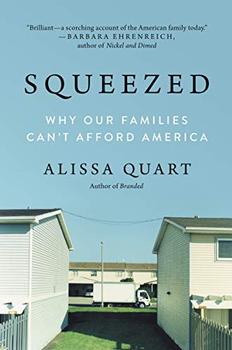Book Club Discussion Questions
In a book club? Subscribe to our Book Club Newsletter!
For supplemental discussion material see our Beyond the Book article, Universal Basic Income and our BookBrowse Review of Squeezed.
Please be aware that this discussion guide will contain spoilers!
- Do you think it's harder to be a middle class parent today than it was when you were growing up? How does this make you feel?
- Which people or characters in the book do you identify with and why? Who don't you identify with? Why? Did anyone's story move you? Did you feel like some people could have tried harder or taken different paths to achieve greater stability and success?
- Quart argues that America per se doesn't care about care. What does that mean to you? Do you think caregiving—by parents, guardians, daycare workers and babysitters or even teachers and nurses—is undervalued in our country? Why are they paid so little and given less respect than other professions?
- Quart questions the "do what you love" philosophy that has led a number of parents in the book to not be able to support their families. Is it better to be alienated from one's work yet pay the bills? Or love what you do and not be able to earn your keep? Which path reflects your own experience?
- Why do you think many European countries do so much better with paid maternity leave and childcare than the U. S. does? What countries does the book mention? What prevents the U.S. from resembling them? How has this near-absence of paid leave and government-supported childcare in America impacted your life?
- Do you feel comfortable discussing your economic situation with your friends and colleagues? With your children? What do you think about Quart's ideas for talking with your kids about social class and financial instability? Would this work with your children or do you have another way to explain poverty and wealth to them? What kinds of questions do they ask?
- Middle class life is 30% more expensive now than in the mid-90's. Why has the middle class in America floundered according to Squeezed? What does "middle class" mean to you? Were you surprised to learn that college professors, trained lawyers and IT workers sometimes struggle to get by?
- Should companies and corporations and other institutions better address their employees' childcare needs and child-rearing lives, providing nursery and daycares for their workers? Or is that individuals' responsibility?
- Quart writes about parents that attempt to hack the system through co-parenting collectives, retraining programs, and bartering and trading among other smaller fixes. Which of these appeal to you personally? And what are your families' hacks so you can better survive economically?
- Quart also writes of what she calls the motherhood advantage, or parents discovering their leadership and workplace skills through parenting rather than in spite of it. How has your work life gotten better and worse since you became a parent? What things has your child taught you that you bring to work each day?
Unless otherwise stated, this discussion guide is reprinted with the permission of Ecco.
Any page references refer to a USA edition of the book, usually the trade paperback version, and may vary in other editions.
